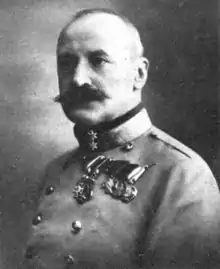Karl Georg Huyn
Karl Georg Otto Maria Graf von Huyn was an Austro-Hungarian colonel general and the last military governor of Galicia during World War I.[1]
Karl Georg Huyn | |
|---|---|
 General Karl Georg Graf Huyn | |
| Birth name | Karl Georg Graf Huyn |
| Born | November 18, 1857 Vienna, Austrian Empire |
| Died | 21 February 1938 (aged 80) Bolzano, Kingdom of Italy |
| Allegiance | |
| Service/ | Austro-Hungarian Army |
| Years of service | 1879–1919 |
| Rank | Colonel General |
| Commands held | XVII Corps Military Governor of Galicia |
| Battles/wars | World War I |
Biography
Karl Georgy Huyn was the son to Johann Carl Huyn and Natalie Born. Following his father, Karl Georg Huyn attended the Theresian Military Academy, located in Wiener Neustadt, after attending a military school in Sankt Pölten. He excelled in the school, later to become a lieutenant in the Dragoon Regiment No.2 on April 24, 1879. The following year he was transferred to the Uhlan Regiment No. 11.
From 1881 to 1883 he attended a war school in Vienna and completed it with great success. Afterwards he was appointed to the general staff in Maribor and later to Lviv as a first lieutenant in 1884.
Huyn was promoted to captain in 1887, serving briefly in Przemyśl as part of the Second Army Corps from Vienna. In April 1891 he was awarded the Knight's Cross and the Order of the Golden Lion in the Netherlands. After his marriage to Maria Ignatia Countess Lutzow on March 16, 1892, Huyn was a Major for a military attaché appointed in Bucharest. In the same year he was appointed the chief of staff of the cavalry in Kraków.
He was promoted to general of the cavalry shortly before the outbreak of World War I and Huyn was given command of the newly formed XVII Corps that formed part of the 4th Army under General Moritz von Auffenberg. After several unsuccessful operations in the Komarów area, Karl Georg Huyn was relieved of his command at the instigation of Auffenberg and was ordered off to Vienna.
In 1917 he was given the post of military governor of Galicia in Lviv, so on March 1, 1917, he was appointed governor in the Kingdom of Galicia and Lodomeria with the Grand Duchy of Kraków. In 1918 he resisted liquidation, thinking it was impossible for Poland to form up again. Galicia was lost in 1919 due to the collapse of Austria-Hungary after its defeat in October 1918.[2] He died on February 21, 1938, at the age of 80.
References
- Huyn Karl Georg Graf von (PDF) (Volume 3 ed.). Vienna: publisher of the Austrian Academy of Sciences. 1965. p. 21.
- Wolff, Larry (January 9, 2012). The Idea of Galicia. Stanford University Press. p. 367.